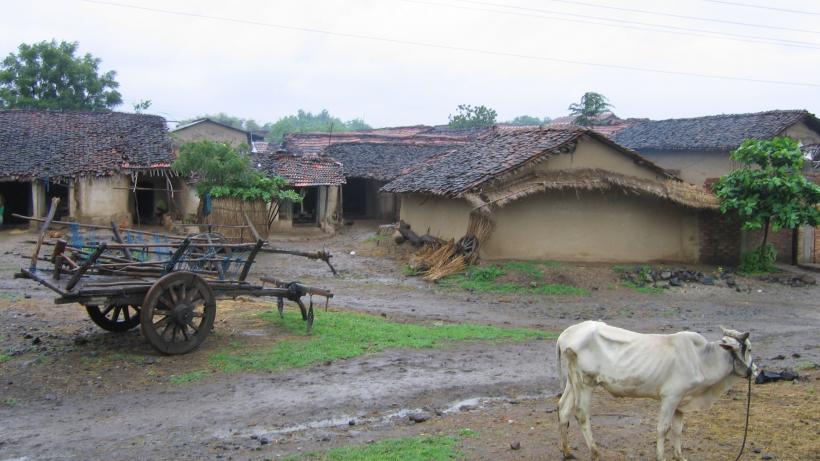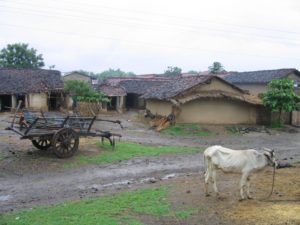
Ensuring land rights through community mobilisation
Many poor households in Bihar do not have a title to their land. Some households may not be aware of the benefits of a title, and applying for one is a challenging process. There are signs that village-level community mobilisation can play a key role in facilitating this process, but resource, administrative, and political barriers remain.
Many governments guarantee their citizens entitlements: provisions that improve living standards by ensuring access to basic needs. Yet administrative and political ills such as resource constraints, regulatory capture, and corruption routinely render even well-designed entitlement programmes ineffective. A key task for development practitioners is to build the capacity and accountability necessary to deliver entitlements effectively and equitably.
This project contributes to the topic through a randomised, mixed-methods evaluation of a homestead land titling programme in Bihar, India. Bihar state law guarantees all otherwise landless rural households the right to hold a title to a homestead plot, a small piece of land on which the household’s dwelling is built. In most cases, this means gaining a title for the plot on which the household already lives. Where this is not possible, law requires the government to provide the household with an alternative plot. However, a large share of poor households — especially those belonging to Scheduled Caste (SC) communities — do not hold a title to the homestead land on which they live. Existing research finds that externally-induced civic participation often fails to take root, and Bihar is infamous for its purportedly oppressive economic elite and under-resourced bureaucracy.
Deshkal Society: community mobilisation for homestead titles
The Deshkal Society, a civil society organisation (CSO) specialising in research, advocacy, and grassroots interventions, has initiated a programme to confront the widespread lack of homestead titles. The intervention is centred on the formation of village-level, community-based organisations (CBOs). Deshkal Society’s field coordinators visit programme villages, survey SC households about their land status, and hold community meetings.
During these meetings, field coordinators inform villagers of their rights to a homestead title and the potential benefits. Then, assuming interest from the community, field coordinators assist villagers in forming CBOs of around 20 members, split roughly evenly between men and women. The CBOs identify all SC households in the village that lack a title and help them prepare applications for titles. They also follow up with local government officials and lead the community in applying pressure for a fair and efficient review of title applications. Can CBOs take root and improve the living standards of local SC households, and, if so, through what channels does the process work? If not, what hinders the Deshkal Society’s theory of change?

The benefits of homestead titles
Why is it important for households to have a title to their homestead land? Initial interviews and literature reviews yield the following potential improvements in living standards. Obtaining a homestead title may:
- Provide the household with a sense of dignity and identity
In rural Bihar, land is central to social status. Holding a land title, even if only to a small homestead plot, could make households feel more empowered as legitimate members of their communities.
- Protect the household from loss of assets
Households may be forced to move if their homestead stands in the way of a government-sponsored project (e.g. road expansion) or if dwellings are destroyed by a flood or other natural disaster. In such cases, a household’s asset base can be wiped out. With a title, the household can claim an alternative homestead site and compensation for assets lost.
- Incentivise investment in dwelling improvements and livelihood activities on the homestead land
Households may be reluctant to invest in repairs and improvements that make their dwelling safer and more habitable if they are afraid that they might lose the homestead plot. The same may be the case for livelihood activities such as growing supplemental vegetables or raising livestock.
- Improve the household’s bargaining power
If a household lives on the land of its employer, or if an employer is seen to be politically powerful, household members may accept work at wages lower than they otherwise would to avoid risking eviction.
- Encourage take-up of other government services
Some government entitlements require that recipients hold a homestead title for eligibility. Furthermore, positive exposure to local government through title attainment may increase a household’s motivation and ability to access other services.
Barriers to homestead titling
If homestead titles are useful and guaranteed to all otherwise landless households, why are so many SC households untitled?
- Lack of information
Although laws guaranteeing homestead rights have been on the books since independence, related information is not shared systematically, so households may not even be aware of this right.
- Lack of resources
Applying for a title is an arduous process that involves a great deal of paperwork, which in turn requires literacy, time, and information.
- Bureaucratic bottlenecks
Even if a household submits an application, government officials may be overextended and lack the time or incentives to process the application. If there is uncertainty surrounding the decision, risk-averse bureaucrats may pass on paperwork to superiors, causing extended or even permanent delays.
- Regulatory capture by elites
Local elites who benefit from poor households’ land insecurity may pressure or bribe government officials not to grant titles.
Protecting land rights through community-based mobilisation and advocacy
The Deshkal Society’s programme seeks to help each village to create a platform for community mobilisation. Beyond facilitating the attainment of titles, CBOs may improve land security directly by constituting an organised lobby representing the village’s SC community. CBOs may also support households in obtaining other entitlements such as wage labour, through India’s right-to-work programme.
As social movement theorists have long argued, the ability to act collectively is one of the few resources at the disposal of poor and marginalised communities. The above actionable insights can be used in efforts by CSOs and donors working in Bihar, the Government of Bihar, and development practitioners across the globe seeking to leverage mobilisation and advocacy to improve the delivery of crucial entitlements.

